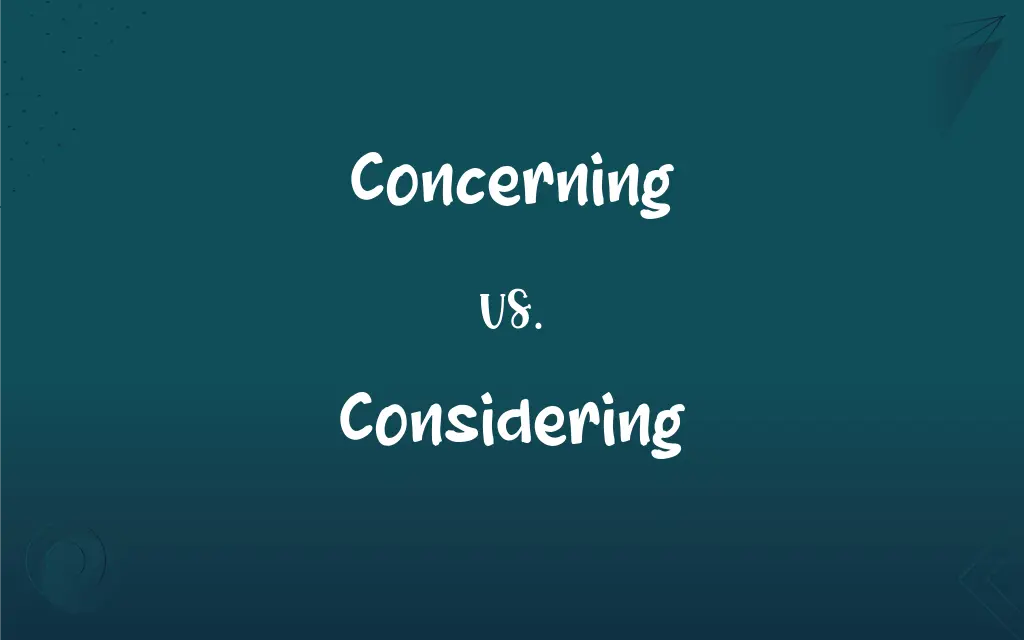Concerning vs. Considering: What's the Difference?
Edited by Aimie Carlson || By Janet White || Updated on November 29, 2023
"Concerning" means relating to or causing worry, while "considering" means taking into account or contemplating.

Key Differences
Concerning typically refers to something that causes worry or relates to a specific matter. In contrast, considering is used when thinking about or reflecting on a particular topic or issue.
In usage, "concerning" often precedes a noun to describe something worrisome or relevant, while "considering" can be used as a preposition or a gerund, implying deliberation or contemplation.
The word "concerning" can also imply involvement or association with a subject. Meanwhile, "considering" suggests evaluation or weighing of various aspects or facts.
"Concerning" is often used in contexts that involve anxiety or distress about a situation. On the other hand, "considering" is typically used in more neutral or even positive contexts, where decision-making or thought processes are involved.
In a sentence, "concerning" directly relates to a topic or issue at hand, often highlighting problems or areas of interest. "Considering," however, is used to introduce factors or circumstances that are being taken into account in a decision or thought.
ADVERTISEMENT
Comparison Chart
Primary Meaning
Relating to or causing worry
Taking into account, contemplating
Part of Speech
Mainly used as a preposition
Used as a preposition or gerund
Context of Use
Often in worrying or relevant situations
In contemplative or decision-making scenarios
Implication
Involvement or relation to a subject
Evaluation or consideration of facts or aspects
Sentence Position
Usually precedes a noun or clause
Can precede or follow the subject of consideration
ADVERTISEMENT
Concerning and Considering Definitions
Concerning
Concerning can also indicate a relation to a particular subject.
The book contains several chapters concerning ancient history.
Considering
Considering is often used to introduce mitigating or relevant facts.
Considering his experience, he is well-suited for the job.
Concerning
Concerning implies involvement or association with a certain issue.
He received a concerning report about the project's progress.
Considering
Considering means taking into account or reflecting on.
Considering the circumstances, her decision was quite brave.
Concerning
Sometimes, concerning is used to introduce a topic or subject of discussion.
Concerning your inquiry, we have found some relevant information.
Considering
It can also mean thinking about something as a possibility.
She is considering a career change.
Concerning
Concerning means causing worry or distress.
The concerning news about the economy made everyone anxious.
Considering
It implies a process of contemplation or deliberation.
They are considering all options before making a decision.
Concerning
Used to denote something that is of interest or importance in a specific context.
There are several concerning factors in the current political climate.
Considering
Considering can introduce a contrast or an unexpected outcome.
Considering the challenges, the project's success was remarkable.
Concerning
In reference to. See Usage Note at participle.
Considering
In view of; taking into consideration
You managed the project well, considering your inexperience. See Usage Note at participle.
Considering
All things considered
We had a good trip, considering.
Considering
Present participle of consider
Considering
Consideration.
Considering
(informal) Given the circumstances.
Your wound doesn't look that bad, considering.
Considering
Taking into account.
Considering the extent of his crimes, he was given a surprisingly short sentence.
FAQs
Can "concerning" be used to express concern?
Yes, "concerning" often indicates worry or anxiety about something.
What part of speech is "concerning"?
"Concerning" is primarily used as a preposition.
Is "concerning" always negative?
While often used in negative contexts, "concerning" can be neutral, relating to a topic.
Can "considering" be used at the start of a sentence?
Yes, "considering" can be used at the beginning of a sentence to introduce a context.
Can "considering" imply possibility?
Yes, "considering" can imply contemplating possible actions or decisions.
Is "considering" formal or informal?
"Considering" can be used in both formal and informal contexts.
Is "concerning" used to introduce subjects?
Yes, "concerning" can introduce the subject or topic of discussion.
Does "considering" always require a follow-up clause?
Usually, "considering" is followed by a clause or phrase that provides context or a condition.
Can "concerning" introduce positive news?
It's less common, but "concerning" can introduce any topic, not just negative ones.
Is "concerning" more formal than "about"?
"Concerning" is slightly more formal and specific than "about."
How is "concerning" different from "regarding"?
"Concerning" often implies worry, whereas "regarding" is neutral and simply refers to a topic.
Does "concerning" require an object?
Yes, "concerning" typically precedes a noun or noun phrase.
What synonyms can replace "concerning"?
Synonyms include "regarding," "pertaining to," or "about."
Can "considering" be used to express surprise?
Yes, "considering" can introduce an element of surprise or contrast.
Can "considering" be used to weigh pros and cons?
Yes, "considering" is often used when evaluating different sides of an argument.
Is "concerning" used in everyday conversation?
"Concerning" is less common in casual speech but is used in formal or written contexts.
Can "considering" be used in legal or academic writing?
Yes, "considering" is appropriate in legal and academic contexts.
Can "considering" stand alone in a sentence?
"Considering" usually does not stand alone and is part of a larger clause.
How does "considering" relate to decision-making?
"Considering" involves thinking about different aspects before making a decision.
Does "considering" suggest a conclusion?
Not always, "considering" may simply introduce factors being thought about without implying a conclusion.
About Author
Written by
Janet WhiteJanet White has been an esteemed writer and blogger for Difference Wiki. Holding a Master's degree in Science and Medical Journalism from the prestigious Boston University, she has consistently demonstrated her expertise and passion for her field. When she's not immersed in her work, Janet relishes her time exercising, delving into a good book, and cherishing moments with friends and family.
Edited by
Aimie CarlsonAimie Carlson, holding a master's degree in English literature, is a fervent English language enthusiast. She lends her writing talents to Difference Wiki, a prominent website that specializes in comparisons, offering readers insightful analyses that both captivate and inform.































































